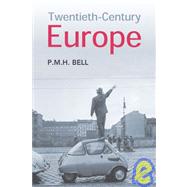Twentieth-Century Europe
, by Bell, P. M. H.- ISBN: 9780340740552 | 0340740558
- Cover: Paperback
- Copyright: 5/26/2006
This insightful study explores the proposition that the idea of European unity makes sense when there is more that unites Europe than divides it, and then asks when that has been true during the past hundred years. Providing the historical context necessary to fully understand the complexity surrounding the European Union beginning with the fundamental definition of what "Europe" means, the book cites specific examples of European cooperation during the past hundred years with particular attention to the last decade of the twentieth century. By emphasizing the vital dimension of historical perspective over more immediate European integration issues such as the euro and constitution, the author demonstrates that Europe's complex history is as much about the destinies and competing claims of the smaller nations as of the larger states. P.M.H. Bell was formerly Reader in History at the University of Liverpool. This insightful study explores the proposition that the idea of European unity makes sense when there is more that unites Europe than divides it, and then asks when that has been true during the past hundred years. Providing the historical context necessary to fully understand the complexity surrounding the European Union beginning with the fundamental definition of what "Europe" means, the book cites specific examples of European cooperation during the past hundred years with particular attention to the last decade of the twentieth century. By emphasizing the vital dimension of historical perspective over more immediate European integration issues such as the euro and constitution, the author demonstrates that Europe's complex history is as much about the destinies and competing claims of the smaller nations as of the larger states. This insightful study explores the proposition that the idea of European unity makes sense when there is more that unites Europe than divides it, and then asks when that has been true during the past hundred years and provides the historical context necessary to fully understand the complexity surrounding the European Union.






